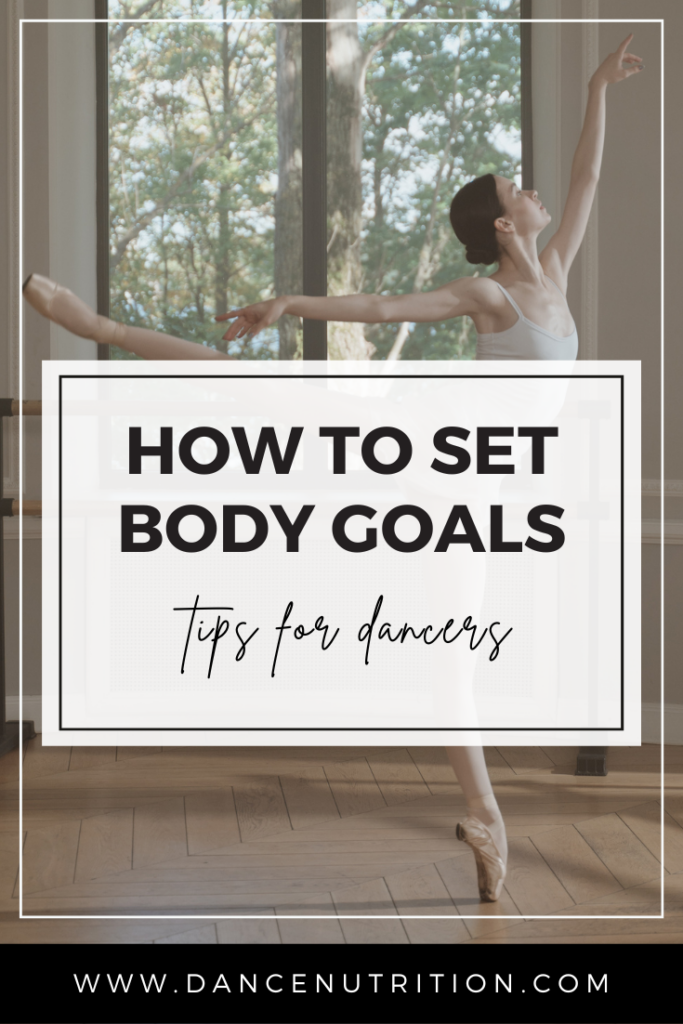Weight loss, muscle gains, and fat loss make up the most common desires for dancers looking to construct body goals. While we know that restrictive dieting isn’t a sustainable path toward these goals, it’s still a tempting route when wanting to look different. This is especially true in a culture that fixates on specific body ideals.
Regardless, is it okay for dancers to have body goals? And can they strive for those goals healthfully? Or do these goals require some bit of restrictive control over food and exercise?
How can dancers build body goals?
Before we dive into some answers, I need you to first realize that your goals, whatever they are, must be realistic. While a licensed professional can help you formulate such goals, realize that when it comes to your body’s weight, shape, and size, no single person can predict those goals— that includes family, friends, artistic directors, teachers, choreographers, and even health professionals like myself. Rather, your genetic blueprint will have the largest impact on your body’s weight, shape, and size.
Now, f you’re younger than 20, recovering from an eating disorder, or currently stuck in a cycle of disordered eating, then body goals like weight loss and fat loss shouldn’t be your priority. Here’s more on what dancers need to consider when wanting to lose weight.
But what if you’re a dancer who eats sufficiently throughout the day, has a healthy relationship with food, and does not follow restrictive dieting rules? Can body goals enter the conversation?
It depends. First, we’ll need to evaluate what a healthy relationship with food looks like since dieting is often disguised even in the “anti-diet” world. Next, let’s dig deeper into your goals. Is your desire to be “healthier” tangled with wanting to be thinner? Thinness doesn’t equate to better health, and for dancers, it can seriously jeopardize your performance potential.
Nonetheless, let’s chat about 3 important points to consider if you are (kinda, sorta) striving for a *REALISTIC!* body goal…
#1: Evaluate The Sustainability of Your Lifestyle
Are you making food and movement decisions that feel good physically, mentally, and emotionally? Can these choices be maintained even on days that don’t feel like your norm (ie. scheduling changes)? If you’re eating a certain way, can you eat this way at a party? Or, do you feel the need to pack your food in fear of finding an option deemed acceptable? If your lifestyle choices are resulting in you missing out on other aspects of life (such as a social life) then you are likely not striving for realistic goals.
#2: Drop The Moral Value Around Food
When we define our ethics and morals on our food choices, we ignite an unsustainable relationship with food, mealtimes, and eating. If we label ourselves as “being bad” or “being good” based on eating certain foods, then feelings of guilt and shame overwhelm mealtimes. The result? An exhaustive road where eating centers more around fear than around fun. A negative mindset while eating is more unhealthy than any “unhealthy food” you might be ingesting.
#3: Consider Gentle Nutrition
Not restricting our food choices doesn’t mean that we shouldn’t consider how foods make us feel, physically. We can utilize gentle nutrition (a concept I chat about here) to choose foods that support satiety, maintain sustained energy levels, promote digestive regularity, and even lend to strong and flexible body composition. Foods like fresh fruits, veggies, legumes, nuts, lean meats, whole eggs, and fish are nourishing options with a multitude of health benefits. But remember that your eating patterns as a whole, over time, matter most. On the flip side, enjoying more indulgent options like cupcakes, french fries, and a cheesy slice of pizza won’t make or break your long-term health.
Ask yourself: how will this food make me feel, physically? Eating a cupcake 15 minutes before a show might not feel great in your tummy once you start dancing. This doesn’t mean the cupcake is “bad” or “unhealthy.” Rather, it means that there might be a better time to enjoy this option. A banana with nut butter, however, will likely offer you a more sustained boost in energy for showtime.



